Home-made antimicrobial beeswax food wraps containing locally sourced herbs could provide low cost food storage in areas of Ukraine where the power supply has been disrupted by the Russian invasion.
Researchers in Wales have teamed up with scientists in Ukraine to develop a kit that could be used by members of the public to make their own beeswax impregnated DIY food wraps to preserve food in the absence of electrical power, particularly in conflict zones.
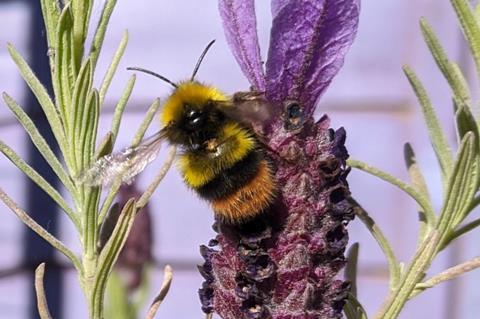
Professor Les Baillie from the Cardiff School of Pharmacy and Pharmaceutical Sciences at Cardiff University said his team has been working with scientists at Kharkiv Polytechnic Institute for a number of years to develop a sustainable, antimicrobial food wrap that could be used to replace single use plastic.
Honey producer
“Ukraine is one of the biggest producers of honey in Europe and so working with bee-derived products and antimicrobial plant extracts was a good fit with the work we are doing in Cardiff,” he said.
“Beeswax impregnated cloth wraps have been used since the 7th century BC to extend the shelf life of food. This is due to the presence of antimicrobial compounds in the wrap which traditionally consists of cotton infused with propolis, beeswax and an oil, commonly coconut or jojoba.
“In a previous GCRF project and with the help of Dr Saira Khan we developed a prototype antimicrobial beeswax wrap containing locally sourced Ukrainian propolis and sage as a sustainable replacement for single use plastic.
“As a result we were granted a utility patent by the Ukrainian Government with further studies needed to bring the approach to market.”
Fresh proposal
Due to the pandemic, Brexit and the Russian invasion of Ukraine, the team were unable to secure the necessary funds for that project, but have now brought forward a new proposal.
“The recent attacks on the Ukrainian power infrastructure have highlighted the urgent need to develop low-cost food storage approaches which do not rely on electrical power. This is of particular importance for regions in which perishable food deliveries are disrupted by the war,” Professor Baillie said.
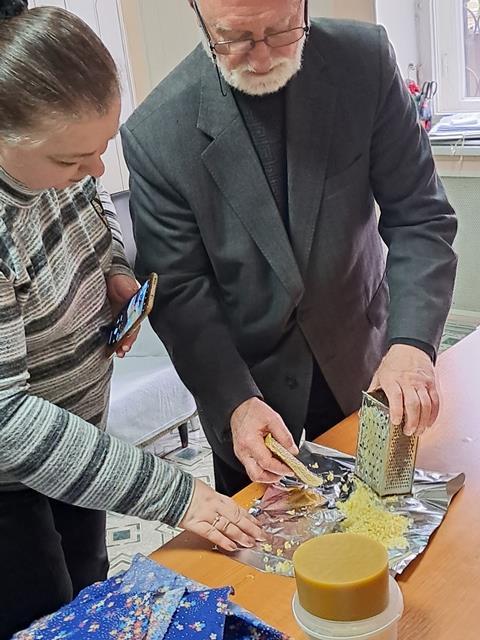
“Thus, with funding from the Welsh government we are currently supporting a short project with our colleagues in Ukraine to advance the development of a beeswax- based food wrap which could be used to preserve food in the absence of electrical power. Such a capability would be of particular use to individuals living and operating in conflict areas.
Environmentally focused
Dr Yudina Yuliia of the National University Pharmacy, Kharkiv Polytechnic Institute, said that when they initially started working on the project, it was more environmentally focused.
“Before the war started in our country, about 10% of food from households went to waste due to microbiological spoilage. There were also problems with plastic waste, which was practically not recycled,” she said.
“Therefore, the social and environmental component of the project was to raise awareness of our citizens about the problem of plastic waste and possible alternative options for storing food in households.
Full-scale invasion
“With the start of the full-scale invasion, new problems related to attacks on infrastructure and military operations have emerged. Continuous power outages have led to inadequate food storage and, consequently, spoilage of a significant amount of food.
“Currently, there is no data on food losses in our country caused by military aggression, but it can be assumed that they are considerable. In addition, there is a problem of food storage for the military, especially those on the front line, and good nutrition is the key to the army’s combat capability. That is why our project has gained relevance in terms of food preservation in extreme conditions.”

While the technology has been around since the 7th century, modern users require that packaging should not only preserve the consumer properties of the product, but also extend its shelf life without compromising its quality.
On the one hand, it must protect the product from external contamination, and on the other hand, it must ensure the safety of its use. The product needs to demonstrate functionality, cost-effectiveness, environmental friendliness, ability to attract interest and to be as simple to make as possible.
Natural antimicrobial agents
The team focused on natural antimicrobial agents such as beeswax and propolis, partly because one of the goals was to support Ukrainian beekeeping.
“The country has a long history of developing this type of activity, but today due to the economic crisis and the war, Ukrainian beekeepers use only 10% of the industry’s potential,” Dr Yuliia said.
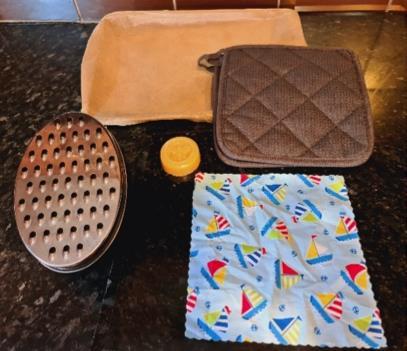
“The inclusion of beeswax, which is a powerful water repellent, in packaging materials can lead to improved moisture protection and mechanical properties, as well as the appearance of fresh produce.
“Also, it was found that beeswax is effective against Gram-positive and Gram-negative bacteria as well as fungi. The antimicrobial effects of beeswax have been found against bacteria from the genera Bacillus, Escherichia, Listeria, Proteus, Pseudomonas, Salmonella, Staphylococcus; yeast from the genera Candida, Rhodotorula; and moulds from the genera Aspergillus and Geotrichum.”
Bee-derived product
Propolis, another bee derived product, is used primarily in the pharmaceutical industry due to its wide range of pharmacological effects as an antimicrobial, antifungal, antiviral, anti-inflammatory, wound healing and reparative agent, she explained. This ingredient is widely used in the food industry and can also be used as an active ingredient in the production of natural packaging materials.
“It contains resins (50%), flavonoids and phenolic acids; waxes (up to 30%), essential oils (10%), pollen (5%), and other organic substances (5%), which have a potential antimicrobial properties against more than 100 strains of microorganisms. Thus it has excellent potential for extending the shelf life and improving the quality of food products.”
Production of propolis in Ukraine is estimated at five or tonnes a year, and the growing interest in propolis in the health and medical sector, as well as the growing awareness of its therapeutic properties, are considered to be the main driving forces for the propolis market.
Ancient dosage form
“In our project we used propolis oil extract in the formulations of packaging. Medicinal oil extracts are one of the oldest dosage forms, but have not found wide application in modern medical and pharmaceutical practice. They are non-toxic, capable of extracting and dissolving a wide range of biologically active compounds, which makes it possible to produce phytochemicals with a high content of active ingredients,” Dr Yuliia said.
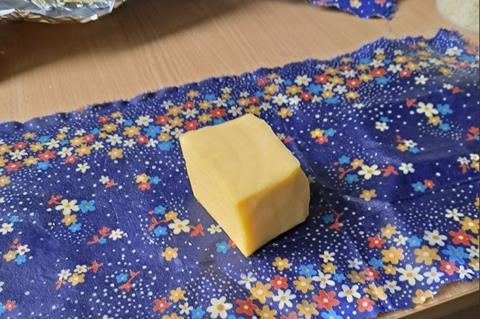
“Microbiological studies have shown the high activity of propolis oil extracts against Gram-positive bacteria, yeasts and dermatophytes. Such extracts may be the optimal form of propolis not only for this project, but also for inclusion in topical medicinal and cosmetic preparations, which are planned to be developed.”
Antimicrobials from natural extracts that are used in food packaging applications could maintain food quality while delivering additional health benefits, such as nutritional supplement, she said.
Potential of sage
“Sage (Salvia officinalis) is one of the herbs with a great potential for use as a functional ingredient for the development of active food packaging due to its well-known antioxidant, antibacterial, and antifungal effects.
“These beneficial activities are positively related to phenolic compounds, such as phenolic diterpenoids (carnosic acid, carnosol, rosmanol), phenolic acids (caffeic acid, rosmarinic acid, ferulic acid) and flavonoids (luteolin derivatives, apigenin derivatives.
“Thus, these antibacterial agents have excellent potential for extending the shelf life and improving the quality of several food products. In addition to being a preservative, they can also be used to prevent adverse physical and chemical changes.
“We also used eco-friendly materials as the basis for the packaging: cotton fabrics of various densities, food grade paper and cardboard. These materials are biodegradable, and packaging made of these materials can be shaped in any way, depending on what products will be stored in it.”
Teaming up
The plan is to team up with UK-based company ANAMAD, which supported the previous project to develop a simple food wrapping kit and guidance to enable members of the public to develop their own home-made food wraps using locally available resources.
This builds on the outputs of a recent WEFO, Welsh and Irish Government funded Celtic Advanced Life Science Innovation Network programme in which the team in partnership with Bee1 developed an educational pack to teach STEM skills to school aged children and produce beeswax-based food wraps based on sustainable, natural materials sourced in Wales.
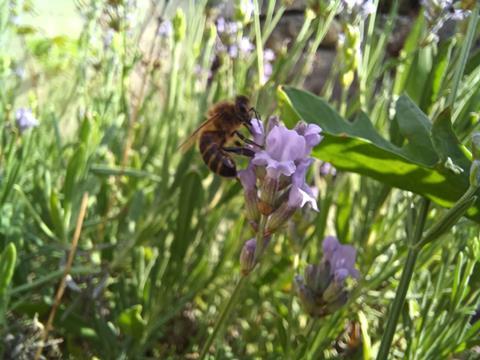
“Our plan is to adopt a similar approach and develop a Ukrainian ‘how-to’ guide which will be shared across Ukrainian social media platforms. The guide will include links to local sources of sustainable bee and plant derived raw materials. To inform this guidance, laboratory studies will optimise the beeswax formulation to develop an approach which maximises antimicrobial activity at minimum cost,” Dr Yuliia said.
“Ukraine is the biggest producer of honey in Europe, with large parts of the population able to access bee derived products such as beeswax and propolis.”
Technological approaches
“We developed two technological approaches which incorporated antimicrobial propolis and a sage extract produced by the Ukrainian partners. We will undertake further formulation studies in Ukraine to identify the formulation and approach best suited to the use as part of a DIY food wrap,” Dr Yuliia said.
“Due to problems with travel to Ukraine, the Cardiff team have provided details of the methods they have developed to determine the antimicrobial activity of the optimised food wrap.”
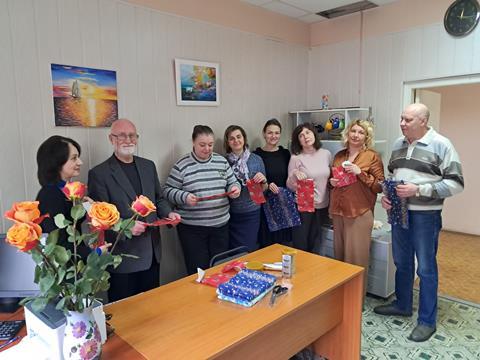
The team are also in the process of developing a guide showing how to create a food wrap using locally available resources, adapting an existing ‘how to’ guide developed in Wales and translating it into Ukrainian.
Promoting the guide
The Ukrainians will undertake a social media campaign with support from Ukrainian advertising companies to promote the DIY guide and provide advice on how to access sustainable, locally sourced, raw materials, targeting both beekeepers across the country and settlements near the front line that are still experiencing problems with power supply.
The researchers also hope to develop an outline for a future research proposal to Horizon Europe to develop commercial food packaging materials.
To find out more about the current proposal, contact Prof. Baillie at Bailliel@cardiff.ac.uk.
Topics
- Antimicrobials
- Applied Microbiology International
- Bacteria
- Be inspired
- beeswax
- Cardiff University
- Community
- Economic Equality
- Food Microbiology
- Food Security
- food wraps
- Fungi
- Infection Prevention & Control
- Kharkiv Polytechnic Institute
- Les Baillie
- One Health
- Propolis oil
- sage
- Saira Khan
- Salvia officinalis
- UK & Rest of Europe
- Yudina Yuliia







No comments yet